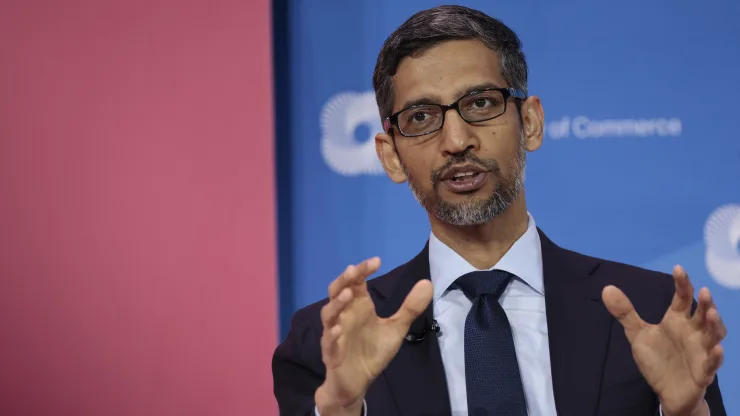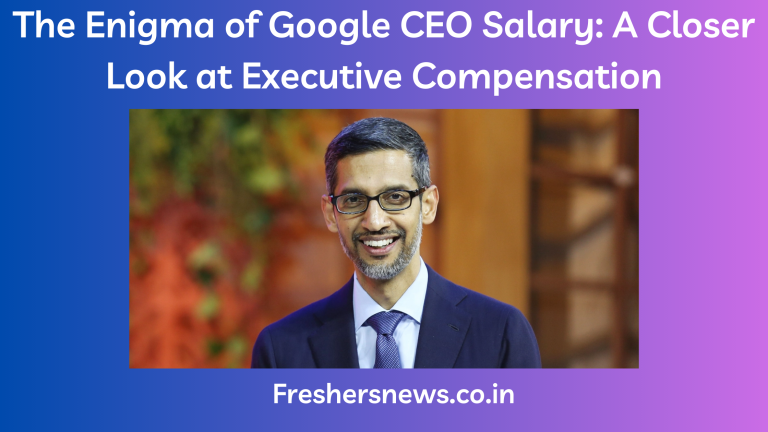Introduction:
As one of the most influential technology companies in the world, Google has always been under the spotlight. From The Enigma of Google CEO Salary and its groundbreaking innovations to its corporate culture, Google’s every move draws attention.
One topic that never fails to pique curiosity is the salary of its CEO. This article delves into the enigma of Google CEO’s salary, shedding light on the intricacies of executive compensation in one of the tech industry’s giants.
The Curiosity Surrounding Google CEO’s Salary:
The salary of a CEO typically consists of multiple components, including base salary, bonuses, stock options, and other forms of compensation. These elements can vary based on the company’s performance, the CEO’s performance, and various other factors. However, specific details regarding executive salaries are often disclosed in public filings, such as annual reports or proxy statements.
Historically, Google has provided its CEO with a substantial compensation package, aligning with the company’s size, influence, and Enigma of Google CEO Salary financial success. Sundar Pichai, as the CEO of Google, has likely received a significant salary and additional benefits.

The Enigma of Google CEO Salary (Image Source: cnbc.com)
For the last 15 years, Sundar Pichai has been everyone’s favorite and one of the most influential people in the world. His calm behavior, honesty, and Enigma of Google CEO Salary coolness attract people and they yearn to become like him. Sundar has been working with Google for 18 years now. He is the man behind the company’s extreme growth. According to sources, Google CEO Sundar Pichai Salary per Day is around Rs.50, 000.
Understanding Executive Compensation at Google:
Compensation for top executives, including the CEO, at Google and similar large companies, is a multifaceted subject. It involves various elements aimed at attracting and retaining talented leaders while aligning their interests with those Enigma of Google CEO Salary of the company’s shareholders. Here are some key points to consider:
- Base Salary: This is the fixed amount executives receive annually or monthly. While it’s part of the overall compensation, it’s often relatively modest compared to other components.
- Bonuses: Executives may earn cash bonuses based on their performance and the company’s financial and operational metrics. These bonuses can vary each year and are often linked to specific targets or key performance indicators.
- Stock-Based Compensation: Many executives receive a significant portion of their compensation through stock grants or stock options. These grants allow them to buy company shares at a predetermined price or receive Enigma of Google CEO Salary shares directly. The value of these grants depends on the company’s stock performance over time.
- Long-Term Incentives: Executives may be offered performance-based equity awards or other long-term incentives to drive long-term growth and shareholder value. These awards are typically tied to specific goals or metrics, such as Enigma of Google CEO Salary increasing earnings per share or achieving strategic milestones.
- Perks and Benefits: Executives often enjoy additional perks and benefits, such as retirement plans, health benefits, life insurance, and other forms of compensation intended to enhance their overall package.
It’s important to note that the specific details of executive compensation at Google, including the CEO’s salary and other components, can change over time. For the most accurate and up-to-date information, it’s best to refer to Google’s official disclosures, such as annual reports or proxy statements.
Furthermore, executive compensation has faced increased scrutiny and calls for transparency in recent years, emphasizing alignment with company performance and shareholder interests. As a result, companies like Google may face the Enigma of Google CEO Salary and greater pressure to provide clearer and more comprehensive information about their executive compensation practices.
Unveiling the Complexities of Google CEO’s Compensation:
The compensation of Google’s CEO involves several intricate components that contribute to its complexity. These components are designed to attract and retain top-tier talent while aligning the CEO’s interests with those of the company’s shareholders. Here are the key intricacies worth exploring:
- A Modest Base Salary: Sundar Pichai, Google’s CEO since 2015, receives a base salary of $2.9 million annually. While this may seem significant to most employees, it is considered modest in the realm of executive compensation.
- Performance-Based Bonuses: In addition to the base salary, a significant portion of Pichai’s earnings comes from performance-based bonuses. These bonuses are tied to various factors, including the company’s financial performance, innovation, and strategic achievements.
- Stock Awards and Equity: Pichai’s compensation package includes substantial stock awards and equity grants. These incentives, Enigma of Google CEO Salary, are designed to align his interests with Google’s long-term success, as their value is linked to the company’s stock performance.
- Long-Term Incentives: Google also Enigma of Google CEO Salary provides long-term incentives, such as stock options, to align the CEO’s interests with those of the company and its shareholders. Stock options allow Pichai to purchase company shares at a predetermined price, potentially benefiting from future stock price increases.
- Pay Discrepancy and Public Perception: The significant difference between CEO salaries and those of regular employees has sparked debates on income inequality. Critics argue that such large compensation packages contribute to wealth disparities. However, proponents contend that the high stakes and responsibilities associated with leading a global tech giant justify substantial rewards.
- Transparency and Accountability: Companies are increasingly pressured to be more transparent and accountable regarding Enigma of Google CEO Salary executive compensation. Shareholders and the public seek clearer explanations of how CEO salaries are determined and whether they align with performance. This push for transparency has prompted companies like Google to disclose more information about their executive pay practices.
Factors Influencing Google CEO’s Salary Determination:
The determination of the Google CEO’s salary involves various factors that are taken into consideration. A few of them are :
- Company Performance: The CEO’s compensation can be affected by the overall performance of the company. Strong financial results, growth, and market success may lead to higher compensation.
- Industry Benchmarking: Google considers industry benchmarks and market standards to ensure competitive CEO salaries. Compensation committees and boards of directors review executive salaries at similar companies.
- Experience and Qualifications: The CEO’s experience, qualifications, and track record are important considerations. Factors like the Enigma of Google CEO Salary, previous leadership roles, industry expertise, and success in driving company growth and innovation impact compensation.
- Executive Compensation Policies: Google likely has established policies that guide CEO salary determination. These policies consider factors such as financial performance, market conditions, and internal pay equity.
- Board of Directors and Compensation Committee: The board of directors, often supported by a compensation committee, is responsible for setting the CEO’s salary. They evaluate the CEO’s performance, consider market factors, Enigma of Google CEO Salary, and make decisions based on a comprehensive process.
- Shareholder Influence: Shareholders’ opinions and concerns can influence executive compensation. Increased shareholder activism and demands for transparency have impacted CEO salary discussions.
- Regulatory and Governance Considerations: Google, as a publicly traded company, must comply with regulations and governance standards. Compensation decisions undergo scrutiny, and adherence to laws and regulations is crucial.
It’s important to note that these factors can vary in weight and application. For the most accurate and up-to-date information on the CEO’s salary at Google, referring to official disclosures like annual reports or proxy statements is recommended.
FAQs about The Enigma of Google CEO Salary:
What is the earning of Google’s CEO?
Sundar Pichai, Google’s CEO, has a net worth of 1310 million USD.
Does the CEO’s income solely come from the base salary?
No, the CEO’s compensation comprises various elements in addition to the base salary. These include performance-based bonuses, stock awards, equity grants, and long-term incentives.
How are performance-based bonuses determined?
Performance-based bonuses for Google’s CEO depend on factors such as financial metrics, innovation, and the achievement of strategic goals.
What do stock awards and equity grants entail?
Stock awards and equity grants are significant components of the CEO’s compensation package. They grant the CEO ownership stakes in the company and are typically linked to the company’s stock market performance.
How do long-term incentives function?
Long-term incentives, such as stock options, allow the CEO to purchase company shares at a predetermined price. These incentives align the CEO’s interests with those of the shareholders and encourage long-term growth.
Why is there a debate regarding CEO salaries?
The debate on CEO salaries revolves around concerns about income inequality. Critics argue that the substantial gap between executive pay and regular employee wages contributes to societal inequalities.
What measures are companies like Google taking to enhance transparency?
Companies like Google are increasingly disclosing information about their executive compensation practices to address the demand for transparency. Shareholders and the public expect clearer explanations of how CEO salaries are determined and whether they reflect performance.
Who determines the CEO’s salary?
The CEO’s salary is generally determined by compensation committees and boards of directors. They consider factors such as market benchmarks, company performance, and industry standards.
What challenges do companies encounter when setting CEO salaries?
Companies face the challenge of striking a balance between attracting and retaining top talent while addressing concerns about income inequality. Achieving equilibrium between competitive compensation and societal considerations is a complex task.
What does the CEO salary debate signify?
The CEO salary debate indicates ongoing discussions regarding income inequality and the evolving expectations for transparency and fairness in executive compensation practices.
Conclusion:
Enigma of Google CEO Salary compensation includes components like performance-based bonuses, stock awards, equity grants, and long-term incentives, aligning their goals with company success and shareholder value. The CEO salary debate raises concerns about income inequality, with critics highlighting the gap between executive pay and regular employees’ wages.
However, proponents argue that leading global tech giants justifies substantial rewards. Companies like Google are becoming more transparent about executive pay practices to address calls for transparency. Shareholders and the public expect clearer explanations of how CEO salaries are determined and if they reflect performance.
Factors such as market benchmarks, company performance, industry standards, and the influence of compensation committees shape executive pay determinations. Transparency and fairness in executive compensation are increasingly important as the corporate landscape evolves. Balancing attracting talent and addressing income inequality is a challenge for companies.
In conclusion, Enigma of Google CEO Salary, exemplified by Sundar Pichai, showcases the complexity of executive remuneration. Performance-based bonuses, stock awards, equity grants, and long-term incentives significantly contribute to the CEO’s earnings. The Enigma of Google CEO Salary debate sparks ongoing discussions about income inequality and the need for transparency in executive pay practices.

